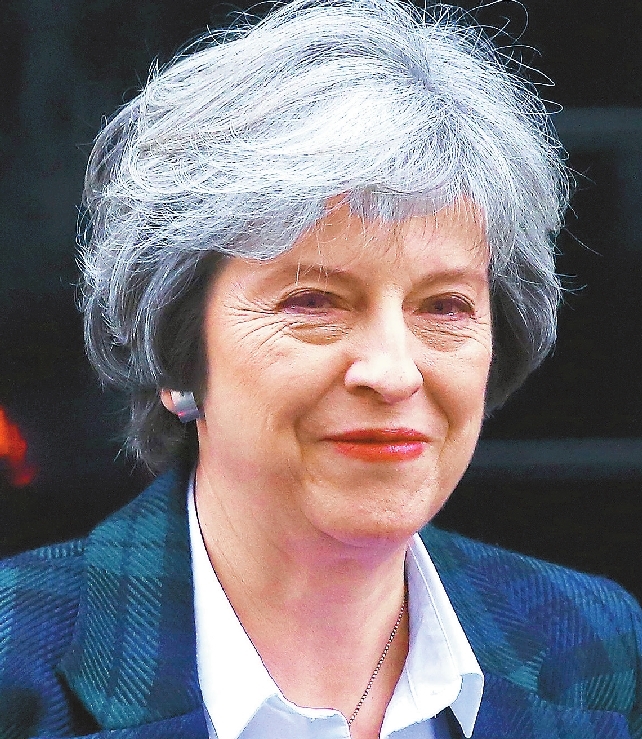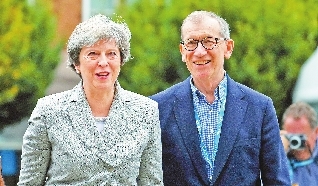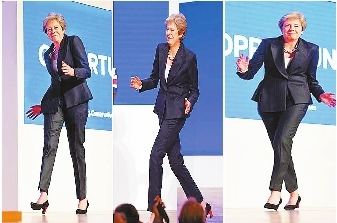


BRITISH Prime Minister Theresa May survived a political crisis over her Brexit deal Wednesday, winning a no-confidence vote by Conservative lawmakers that would have ended her leadership of party and country. But the margin of victory — 200 votes to 117 — leaves May a weakened leader who has lost the support of a big chunk of her party over her handling of Britain’s exit from the European Union (EU). It also came at a steep price as she promised not to run for re-election in 2022. Britain’s Brexit problem, meanwhile, remains unsolved as May seeks changes to her EU divorce deal in order to make it more palatable to parliament. May said she was “pleased to have received the backing of my colleagues” but acknowledged that “a significant number” had voted against her in Wednesday evening’s secret ballot. “I have listened to what they said,” May promised as she stood in a darkened Downing Street after what she called a “long and challenging day.” The vote has confirmed May’s reputation as a dogged, determined political survivor. A quiet, determined vicar’s daughter, May rose to the heights of British political power by outmaneuvering better known, more outspoken men. May, 62, became prime minister after Britain’s shock June 2016 vote to leave the EU toppled Prime Minister David Cameron, who had called the referendum and then argued for remaining in the bloc in a bid to squelch a long-running party squabble. The favorites in the 2016 Conservative Party leadership competition were Boris Johnson and Michael Gove. The winner was May, who has since then spent her entire premiership trying to deliver on the voters’ decision. Before the referendum, May had backed remaining in the EU bloc, but she has later become one of the staunchest advocates of Brexit. “Brexit means Brexit” became her mantra. For a time, May was able to unite the warring factions of her party, which for decades has been divided over policy toward Europe. But her authority was severely dented when she gambled in April 2017 by calling a snap election in hopes of strengthening her hand in divorce negotiations with the EU — only to lose her majority in parliament. The threat to May had since been building as pro-Brexit Conservative lawmakers grew increasingly frustrated with the prime minister’s handling of Brexit. Many supporters of Brexit say May’s deal, a compromise that retains close economic ties with the EU, fails to deliver on the clean break with the bloc that they want. May kept her government going by cobbling together a deal with the small Democratic Unionist Party of Northern Ireland, which is now threatening to withdraw its support because of opposition to her Brexit deal. The party’s rejection of her deal would leave May’s government in a perilous position. Much of May’s Conservative Party hates the agreement, struck after a year and a half of tough negotiations between Britain and the EU. The pro-Brexit wing of the party says it gives too much away and will leave Britain bound to EU rules after it leaves. Pro-EU Conservatives criticize May for ruling out a softer Brexit in which Britain remains in the EU’s single market and customs union. In a bid to win over wavering lawmakers, May indicated before Wednesday’s vote that she would step down before the next election, due in 2022. Solicitor-General Robert Buckland said May told lawmakers at a meeting that “it is not her intention to lead the party in the 2022 general election.” May’s victory is a reprieve but does not lay to rest uncertainty about Britain’s EU departure, due March 29. Opposition lawmakers expressed astonishment and outrage at the Conservative civil war erupting in the middle of the fraught Brexit process. Jeremy Corbyn, the leader of the Labor Party, meanwhile tweeted that the vote was evidence the prime minister’s government was “in chaos.” “Tonight’s vote changes nothing. Theresa May has lost her majority in parliament, her government is in chaos and she’s unable to deliver a Brexit deal that works for the country and puts jobs and the economy first. She must now bring her botched deal back to parliament next week,” Corbyn wrote on Twitter. British business figures also expressed exasperation at the continuing political uncertainty. “With news that the prime minister remains in place, business communities will hope that these political games can finally be put to bed,” said Adam Marshall, director general of the British Chambers of Commerce. “Westminster must now focus all its energy on urgently giving businesses clarity on the future and avoiding a messy or disorderly Brexit.” Among EU leaders there is sympathy for May’s predicament — but also exasperation at Britain’s political mess. The European Parliament’s Brexit point man, Guy Verhofstadt, could not contain a note of annoyance, tweeting: “Once again, the fate of EU-U.K. relations, the prosperity of businesses and citizens’ rights are consumed by an internal Conservative party catfight over Europe.” May has vowed that she would “see this through” and secure parliament’s backing for her deal. Few doubt her fortitude and commitment to an idea of public service instilled in her upbringing as the daughter of an Anglican clergyman, one of several points which has drawn comparisons between her and German Chancellor Angela Merkel. Born Theresa Brasier in the southern English seaside town of Eastbourne in 1956, May received her education at a series of little-known state and private schools, which has been contrasted with the elite Etonian background of Cameron and many in his “Notting Hill Set” circle. May’s father died following a car crash in 1981 and her mother, Zaidee, who had multiple sclerosis, died a few months later, leaving her an orphan in her mid-20s. Like Cameron, she attended Oxford University but kept a low profile. It was here that she met her husband Philip, a banker — they were reportedly introduced by Benazir Bhutto, later assassinated as Pakistani premier. The couple married in 1980 but were unable to have children. May’s rival Andrea Leadsom withdrew from the leadership race in 2016 two days after his comments were published suggesting this made her less qualified to be prime minister. May worked in finance, including at the Bank of England, before being elected as member of parliament for the London commuter town of Maidenhead in 1997. May soon established a reputation for unflashy competence and a knack for vanquishing her rivals. She served for six years in the notoriously thankless job of home secretary, responsible for borders, immigration and law and order. In 2013, May revealed she has type 1 diabetes, meaning she has to inject herself with insulin at least twice a day. But she insisted it would not affect her career, saying it was a question of “head down and getting on with it.” The diabetes charity JDRF says it could make her the first world leader publicly to acknowledge having the condition. While widely respected, she is not part of any clique at Westminster, acknowledging that she does not drink in parliament’s many bars or “gossip about people over lunch.” Instead, a source who has worked closely with her said on condition of anonymity she was “incredibly hard-working.” “She’s always got up three hours before everybody else and knows five times more than anyone else in the room,” the source added. “Theresa is not going to do anything radical... she’s incredibly risk-averse, a safe pair of hands.” But her fabled hard work and stubbornness alone may not be enough. As Britain’s second female prime minister, May is inevitably compared to the first, Margaret Thatcher, whose steely determination May admires. In November 1990, Thatcher faced a leadership challenge from Conservative rivals. She won the ballot, but not by enough to avoid a second-round vote. “I shall fight on,” Thatcher said defiantly. “I fight to win.” Within a week, she had been replaced. (SD-Agencies) | 
